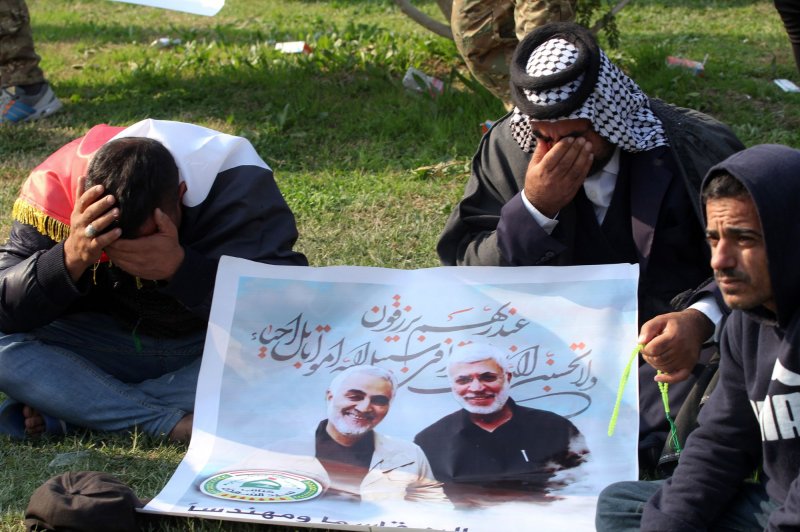People mourns and carry the pictures of Iranian military commander Qassem Soleimani during a funeral procession in central Baghdad on Saturday. Photo by Ibrahim Jassam/UPI |
License Photo
No one in the United States will mourn the death of Qassem Soleimani, the late commander of Iran's Quds force, eviscerated by Hellfire missiles last week at Baghdad airport. Likewise, few mourned the overthrow and hanging of Saddam Hussein in 2003, a villain who murdered, tortured and abused millions of his countrymen and women.
But the ironic tragedy remains that the region might have been better off had Saddam remained in power overseeing a stable and yet repressive Iraq while counterbalancing an aggressive Iran.
A parallel question is whether Soleimani's assassination will bring more ill than good to the region and to America's global standing. Predictably, the Iraqi government, to the degree it exists, is demanding in a nonbinding resolution the withdrawal of all foreign troops, principally American. U.S. President Donald Trump has threatened sanctions if Iraq carries through on this demand.
Tehran has declared it will lift all restrictions on enrichment of uranium. That means Iran will be technically capable of developing nuclear weapons. Had the now defunct Joint Comprehensive Plan of Action been honored by all parties, Iran would have foregone that option in perpetuity.
Thus far, the only good news is that the Trump administration's promise to terminate "endless" wars by leaving Iraq could occur, involuntarily. Unfortunately, America's last withdrawal from Iraq did not work. No doubt, Iran's regional influence must increase as America retrenches.
The latest presidential threats by tweet may prove as hollow as the ones Trump unleashed against North Korea promising "fire and fury." Instead, those warnings turned into "love letters," something that is unlikely to happen with Iran's mullahs. Indeed, this mercurial president may decide that if Iran does increase its enrichment of uranium, those facilities are now fair game to pre-emptive military strikes, much as Operation Iraqi Freedom was meant to deprive Saddam of any chance of becoming a nuclear power.
Saddam's weapons of mass destruction, however, were nonexistent. Perhaps the "imminency" of attacks alleged to be personally coordinated by Soleimani will turn out to be exaggerations or just plain wrong and manufactured as reasons for killing the Quds commander. That possibility, given the failure to evaluate properly Saddam's WMD, cannot be ignored.
Yet, despite the value of bringing Soleimani to American justice, the consequences for the West and the Trump administration may be disastrous. The question is where do Tehran and Washington go from here? As former Chairman of the joint Chiefs Adm. Mike Mullen observed last week, running room for both sides is shrinking, along with "off-ramps" to minimize possible military collisions.
As internal military lines of communications often provide advantages, asymmetric responses favor Iran. In Iraq, the use of surrogate Iraqi militias to attack facilities where Americans may be present seems self-evident. And in those conditions, against whom could America retaliate? Killing Iraqis in Iraq is not smart policy and will provoke strong internal responses.
Direct attacks against Iran would be an act of war, although how "war" would be waged is unclear. After all, the United States spent over a decade dropping more bombs on North Vietnam and Cambodia than it did during all of World War II without a formal declaration. Iran would use its proxies in the region, cyber and possibly more attacks against Saudi oil facilities and shipping in the Gulf in retaliation.
For now, all logic has been turned upside down. Should the United States be forced to leave Iraq, suppose Trump does impose sanctions? After nearly 17 years of interventions to "democratize" the greater Middle East; a trillion dollars spent on that endeavor; tens of thousands of American and allied casualties; and many hundreds of thousands dead or injured Iraqis, the United States will have turned full circle with sanctions.
In his second or third tour in Iraq, Gen. David Petraeus poignantly asked, "Tell me how this ends?" Worse, if Trump follows through on his threat to attack Iran's "cultural targets" -- a clear violation of international law and a war crime -- will the military obey an obviously illegal order? And how will Congress react, given that the 2001 resolution authorizing the use of military force clearly does not apply to making war on Iran?
The crucial question that must be answered is what is driving Trump's decision-making process? Does he believe as president his powers are virtually unlimited and have no consequences that he cannot control? Does he believe that his bold, deal-making experiences in the private sector work anywhere when they do not? Or is there another darker explanation?
No matter the answer, this is not good.
Harlan Ullman is UPI's Arnaud de Borchgrave Distinguished Columnist and a senior adviser at the Atlantic Council. He has served as a professor of military strategy at the National War College and the Naval War College. His latest book is "Anatomy of Failure: Why America Has Lost Every War It Starts." Follow him @harlankullman.















